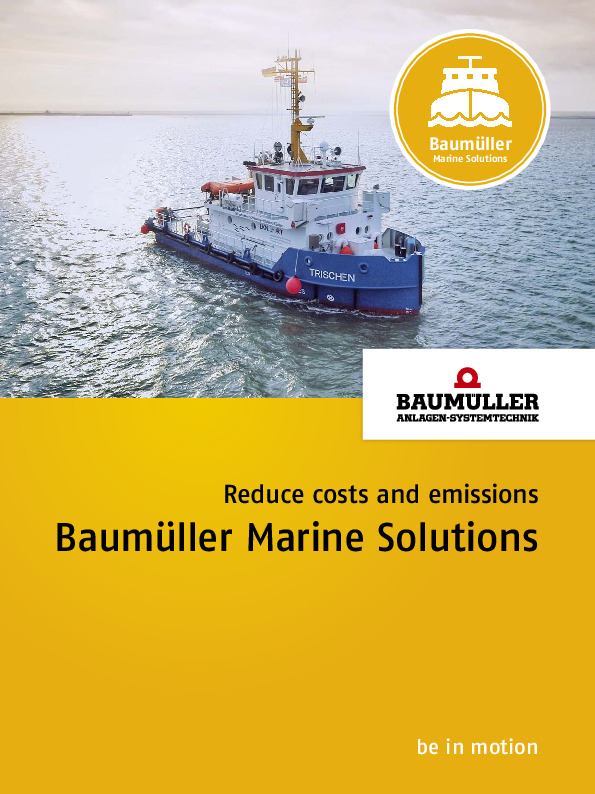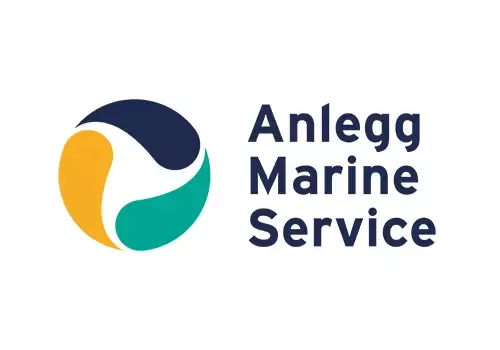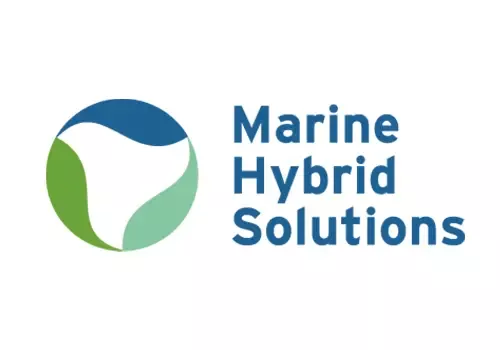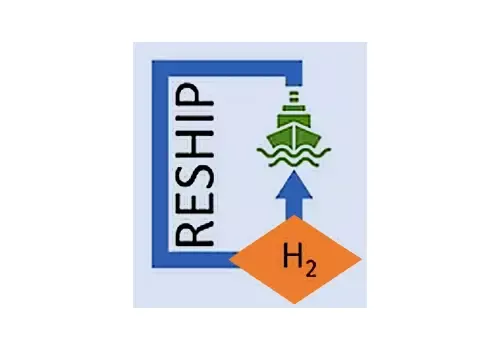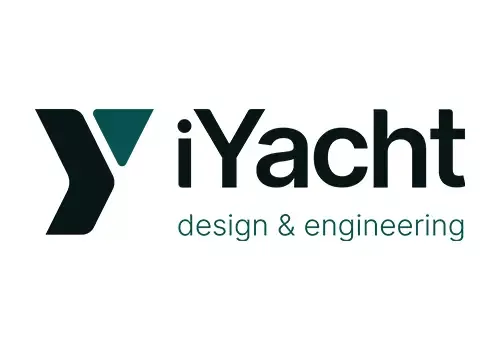Hydrogen ship propulsion – the emission-free future of marine mobility
Hybrid hydrogen ship propulsion is an extremely promising solution for emission-free marine transport. In the spectrum of alternative drive systems, it is still much less widespread than diesel and gas generators. However, development is progressing at a tremendous pace, as it should. This is also thanks to a variety of research and funding programs that aim to make hydrogen suitable for ship propulsion. Hydrogen is thus a promising energy carrier for shipping.
With our many years of experience in the field of electric drives, we always keep a close eye on the development of new technologies.
Baumüller is a partner for shipyards, system integrators and ship owners, as well as being an independent supplier of complete systems.
How does a hydrogen drive work on a ship?
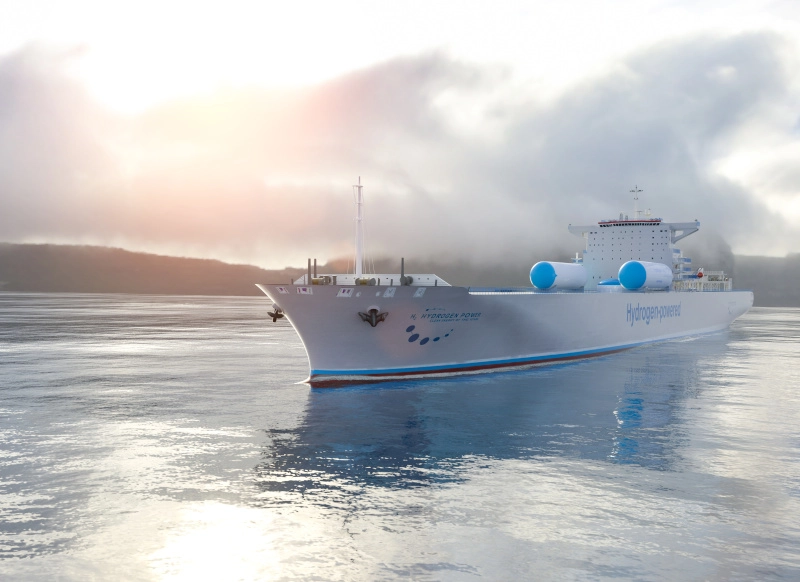 Essentially, ship propulsion on this basis always entails an electric motor in the drive train. The energy for this drive is generated in fuel cells, for example. Fuel cells are energy converters in which a fuel like hydrogen reacts with an oxidizing agent like oxygen. In the process, water, electrical energy, and heat are generated. In ship drives, the reaction inside the fuel cell is automatic and does not need to be artificially induced, but it is instead catalyzed. All that is needed is a continuous supply of oxygen from the environment and hydrogen. The latter must be stored and carried on the ship in high-pressure or refrigeration tanks. As an alternative to the fuel cell, there are also hydrogen engines. These generate electrical energy in a process that is analogous to that of conventional generators that use fossil fuels. The hydrogen can be used as a gas or bound in a carrier liquid (e.g. LOHC technology).
Essentially, ship propulsion on this basis always entails an electric motor in the drive train. The energy for this drive is generated in fuel cells, for example. Fuel cells are energy converters in which a fuel like hydrogen reacts with an oxidizing agent like oxygen. In the process, water, electrical energy, and heat are generated. In ship drives, the reaction inside the fuel cell is automatic and does not need to be artificially induced, but it is instead catalyzed. All that is needed is a continuous supply of oxygen from the environment and hydrogen. The latter must be stored and carried on the ship in high-pressure or refrigeration tanks. As an alternative to the fuel cell, there are also hydrogen engines. These generate electrical energy in a process that is analogous to that of conventional generators that use fossil fuels. The hydrogen can be used as a gas or bound in a carrier liquid (e.g. LOHC technology).
Use of hydrogen with our electric motors
Since hydrogen ship propulsion systems involve one or more electric motors, this development is particularly interesting for us at Baumüller. After all, this is our core expertise. We build extremely efficient motors, including the necessary converters and the corresponding control units. Thanks to the options available to us for making individually flexible adjustments to existing systems, our electric motors can also be used for hydrogen drives on ships. Today, our electric and hybrid drives are already being used on a large number of vessels. We have already successfully electrified over 80 ships and boats.
The fuel challenge: transport, storage, infrastructure
A major issue is the fuel itself, as well as its storage and transportation. These factors pose major challenges. In today’s mobility sector, there are several viable storage variants available. Two of them are particularly widespread:
- High-pressure gas storage
- Liquid gas storage
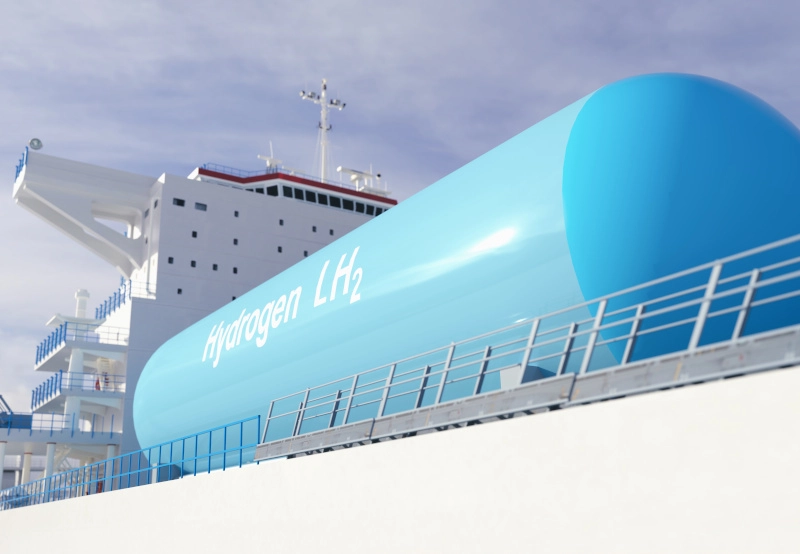 In high-pressure gas storage, hydrogen is stored in pressure tanks. For this variant, the space requirements of the tanks are the biggest concern. In order to achieve ranges comparable to heavy oil or diesel, the hydrogen must be highly compressed. The greater the compression, the less space required on the ship. However, this solution has its limits. These limits are imposed in part by the pressure potential of the tank designs and in part by the energy required for compression.
In high-pressure gas storage, hydrogen is stored in pressure tanks. For this variant, the space requirements of the tanks are the biggest concern. In order to achieve ranges comparable to heavy oil or diesel, the hydrogen must be highly compressed. The greater the compression, the less space required on the ship. However, this solution has its limits. These limits are imposed in part by the pressure potential of the tank designs and in part by the energy required for compression.
At maximum compression, hydrogen is in its liquid phase. This is therefore the point of maximum space efficiency. Extremely low temperatures are required for this to happen. At -253 degrees Celsius, the element liquefies, and it can be stored in cryotanks and is then highly fit for transport. However, one problem that cannot be avoided is “evaporation losses.” This is particularly problematic if the hydrogen is to be stored over a long period following liquefaction. Ideally, this would require a suitable infrastructure including the production of cryogenic liquid hydrogen in or near the ports.
Despite all the challenges, the following holds true: Progress is clearly gathering momentum. Europe and Germany in particular are promoting the development and research of many technologies related to hydrogen propulsion. This also includes smart and efficient solutions for storage and transport, which are currently being driven forward vigorously. Against this backdrop, the prospects for ship propulsion can only be rated as very good.
Non-binding advice - Get in touch with our experts!
Features and advantages of hybrid hydrogen ship propulsion systems
Hydrogen ship propulsion essentially offers advantages comparable to those for other forms of mobility. The most prominent of these advantages is environmental friendliness. The use of hydrogen drives does not produce any emissions that are damaging to the climate or the environment. Energy only has to be used for generation and storage. However, this energy can be acquired from green sources. For maritime shipping, wind energy stands out as a particularly obvious choice. Hydrogen propulsion therefore promises climate neutrality for shipping in the long term.
Further advantages are:
- Climate neutrality
- Unlimited ranges for ships
- Prospects for significant cost reductions in the medium term
- Comparatively safe with low accident rates
- Easy expansion of the hybrid DC system
Another major advantage is the ability to run the system continuously without charging breaks, as would be necessary with purely electric drives. With the ever-improving ability to store cryogenic or highly compressed hydrogen, excellent ranges can be achieved with the ship drive system. Refueling operations are fast and can be easily performed during the loading and unloading of cargo or other berthing activities once an adequate infrastructure is available.
Areas of application – suitability and challenges
There are numerous areas of application for hydrogen ship drives. These include ferries with fixed destinations. This application allows efficient hydrogen generation and refueling. The same applies similarly for supply vessels, such as those used by energy companies for offshore wind farms or drilling platforms.
Hydrogen and fuel cells: clean energy for shipping
Hydrogen offers immense potential for ship propulsion in terms of climate footprint, and overall sustainability. And there are many other advantages, such as a high level of safety. The generation, transport, and storage of hydrogen remain a challenge. While these tasks are unproblematic from a technological point of view, the problem is implementing them economically. Solutions to this are well under way and may even reduce costs in the long term. We at Baumüller are following the developments with great anticipation and would like to do our part in shaping the technology of the future. With our existing marine services and our extensive experience in the field of electric motors, we are already waiting in the wings.
References:
Our motors for ship drives
Our controls for ship drives:
Our marine service:
Downloads
